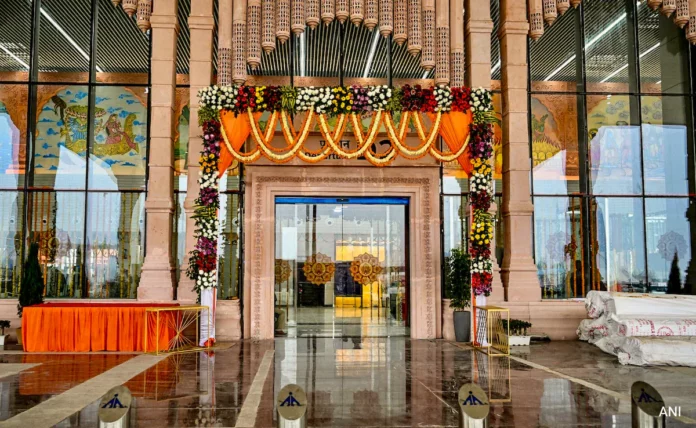AYODHYA: As the temple town of Ayodhya preps up to expand air connectivity with its first airport ahead of the grand consecration ceremony of Ram Mandhir, the Airport Authority of India (AAI) chairman Sanjeev Kumar affirmed that the construction was completed in a record time of 20 months.
Airports Authority of India undertook the development of Ayodhya Airport as per the MoU signed with the Government of Uttar Pradesh in April last year.
The Uttar Pradesh government provided 821 acres of land for the development of Ayodhya Airport, according to a government release.
AAI Chairman Sanjeev Kumar asserted that air connectivity is important for Ayodhya adding that the Airport Authority is happy about the expansion.
“The airport has been built in Ayodhya and AAI has completed it in a record time of 20 months,” Sanjeev Kumar said while speaking to ANI in Ayodhya.
“Air connectivity is important for Ayodhya. With more passenger flow, the connectivity will also improve in Ayodhya. We at Airport Authority are extremely excited about this expansion, I believe the people of Ayodhya are also happy. PM Modi will inaugurate it today,” he added.
With the development of this airport, the pilgrims visiting Shri Ram Mandir along with famous nearby pilgrim destinations like Ram ki Paidi, Hanuman Garhi, Nageshwar Nath Temple, Birla Temple etc will get the benefit of this air connectivity.
The development of Ayodhya Airport will also facilitate businesses and pilgrimage tourism throughout the year and will improve the overall economy of the region.
Pointing to the scope of expanding the terminal at the newly constructed Airport sometime in future, the Airport Authority Chairman said, “Now Ayodhya will be accessible by air also. The terminal built now is small, it will be expanded in the future accordingly.”
As per a government release, the airport has a runway length of 2200m and would be suitable for the operation of A-321 type of Aircraft. Two link taxiways and an apron suitable for parking eight A321 type of aircraft along with a Ground Support Equipment (GSE) area are also constructed.
Under Phase 2, the development of a new terminal building of 50000 sqm is planned which will be able to serve 4000 passengers during peak hours and 60 lakh passengers annually.
The development will also include a runway extension from the existing 2200m to 3750m suitable for the operation of Code E (B-777) type of aircraft, a parallel taxi track and an apron for an additional 18 aircraft parking stands.
Ayodhya has been regarded as one of the seven most important pilgrimage sites (Mokshdayini Sapt Puris) for Hindus.
PM Modi will inaugurate the newly built Ayodhya Airport named Maharishi Valmiki International Airport Ayodhya Dham today at around 12 among many other projects in the region.
The new airport will serve as a Gateway for pilgrims and tourists and give impetus to the overall growth of the region. The airport has been developed at Rs 350 Crore, which includes the construction of the Terminal Building, ATC Tower, Fire Station, Car parking and Allied city-side infrastructure, the release stated.
The terminal building built in an area of 6500 sqm. is equipped to serve 600 passengers during peak hours and 10 lakh passengers annually.
Passenger facilities like nine check-in counters, three conveyor belts (one in the Departure and two in the Arrival hall), and five X-BIS machines have been provided.
The city side of the terminal building is constructed with car and bus parking with Divyangjan-friendly facilities. The airport has been designed keeping in mind the history and importance of Ayodhya.
The structure of the terminal building is inspired by the architecture of the upcoming Shri Ram Mandir of Ayodhya. The interiors of the building are decorated with local artefacts, paintings and murals depicting the life of Bhagwan Shri Ram.
The terminal building is also decorated with many Shikharas adding grandeur to the structure and creating an ambience of spirituality.
The terminal building of the airport is equipped with various sustainability features like an Insulated Roofing System, Provision of Canopies for energy saving, LED Lighting, Low Heat Gain Double Glazing Unit, Rain Water Harvesting to recharge the groundwater table, Landscaping with fountains, HVAC, Water treatment plant, Sewage treatment plant and use of recycled water for landscaping.
A solar power plant with a capacity of 250 KWP has been provided to meet GRIHA – 5-star ratings. (ANI)
Also Read: Ayodhya Ram Temple construction: Idol depicting Lord Ram’s child form near completion







